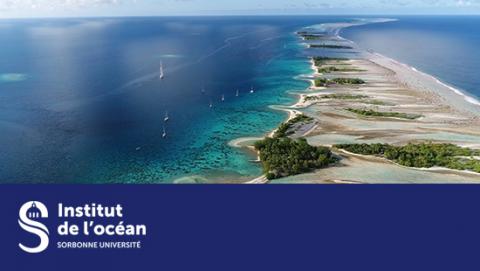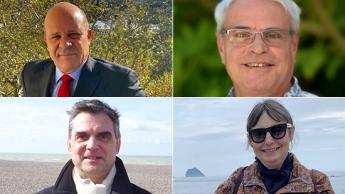
The Ocean and Our Future
Interview with Christophe Prazuck and François Lallier.

Alongside historian Olivier Chaline, neuroendocrinologist Sylvie Dufour and biologist François Lallier, Christophe Prazuck heads the Ocean Institute of the Sorbonne University Alliance. The ambition of this new research community is to bring together marine and maritime sciences and the major economic and societal challenges of the 21st century.
Christophe Prazuck, as well as having been the Chief of Staff of the Navy, you also have a doctorate in physical oceanography. What vision do you wish to bring to this new institute?
Christophe Prazuck: The ocean is a major issue for our children and our society. After forty years of sailing, I wanted to remain close to maritime issues while integrating the world of knowledge and transmission that the university represents.
By taking over the direction of this institute alongside my scientific colleagues, I wish to share my experience of the maritime world and bring a different perspective, that of a practitioner of the sea.
How was the Ocean Institute founded?
François Lallier: This institute was created because of the desire to unite all actors in ocean and maritime sciences within the Sorbonne University Alliance. A few years ago, we submitted a laboratory project and then an excellence initiative. We then took advantage of the momentum generated by the Alliance to create a multidisciplinary thematic institute. In October 2019, with Olivier Chaline, professor at the Faculty of Arts and Humanities, and Sylvie Dufour, researcher at the National Museum of Natural History, we brought together the Sorbonne University Alliance’s strengths: five marine stations, the National Museum of Natural History, the French Navy and the Naval School. The institute came into being four months after this symposium.
As the United Nations declared the Decade of Ocean Science begins in 2021, the creation of this institute also coincides with the appointment of Sorbonne University at the head of the French network of marine universities for a three-year term.
What are your specificities and strengths compared to other bodies in the marine sector such as Ifremer or the European University Institute of the Sea?
C. P.: While these bodies have some of our characteristics, none of them possesses them all. With nearly 1,500 academic researchers, engineers and technicians working in marine and maritime sciences, the Ocean Institute is fast becoming the leading European university player in this field.
With a presence on the Atlantic, the Mediterranean and in Paris, it benefits from a strategic position in the fields of research, education and expertise. Its characteristic is also to cover a very wide range of disciplines, from paleontology to geography and including the study of climate and biodiversity.
What is the main challenge of the Ocean Institute?
C. P.: The sea and the oceans have multiple facets, and impact the way we live, eat and consume. They are at the heart of the major issues of our society, such as climate, globalization, biodiversity, energy, geopolitics and more.
No issue crucial to our society can be solved by a single discipline. This is why the challenge of the institute is to combine the skills and views of our specialists who are internationally recognized in their field. It is not a question of adding a new administrative structure, but of having experts, who do not necessarily know each other, become aware of the extraordinary potential, almost unique in the world, of bringing together their individual knowledge and skills.
Following the prefiguration symposium, you have defined three major interdisciplinary research areas. Can you describe them for us?
F. L.: The first concerns the place of the ocean in the history of the Earth, life and societies. The second deals with the specificities of the ocean and coastal environment in terms of risks and adaptations to global changes. The third studies the expansion of oceanic and maritime circulations in all their forms and their ecological and geopolitical implications.
Participatory science is also one of our areas of development. The ocean is a theme that mobilizes a number of citizens willing to get involved to better understand and preserve it.
Multidisciplinarity is at the heart of the institutes. How do you encourage it in practice?
F. L.: Our strategy is to use the recruitment of doctoral candidates to encourage close collaboration between disciplines and laboratories around a three-year thesis project. In addition, as soon as health conditions allow, we would like to set up thematic meetings around an interdisciplinary topic to create new synergies.
Multidisciplinarity is also at the heart of the education we provide. In 2021, we are going to open the Nemmo university diploma (New maritime issues, globalization and the oceans) offered by the Faculty of Arts and Humanities at Sorbonne University and the teaching pole of the Center for Strategic Studies of the Navy. This multidisciplinary education is intended for all professionals related to the maritime industry and who wish to strengthen their knowledge of the issues that the oceans and maritime spaces represent for our societies.
More broadly, we hope that the institute will become a place of exchange between the academic, socio-economic and political worlds so that we can contribute our interdisciplinary expertise on the major current issues related to the ocean.
